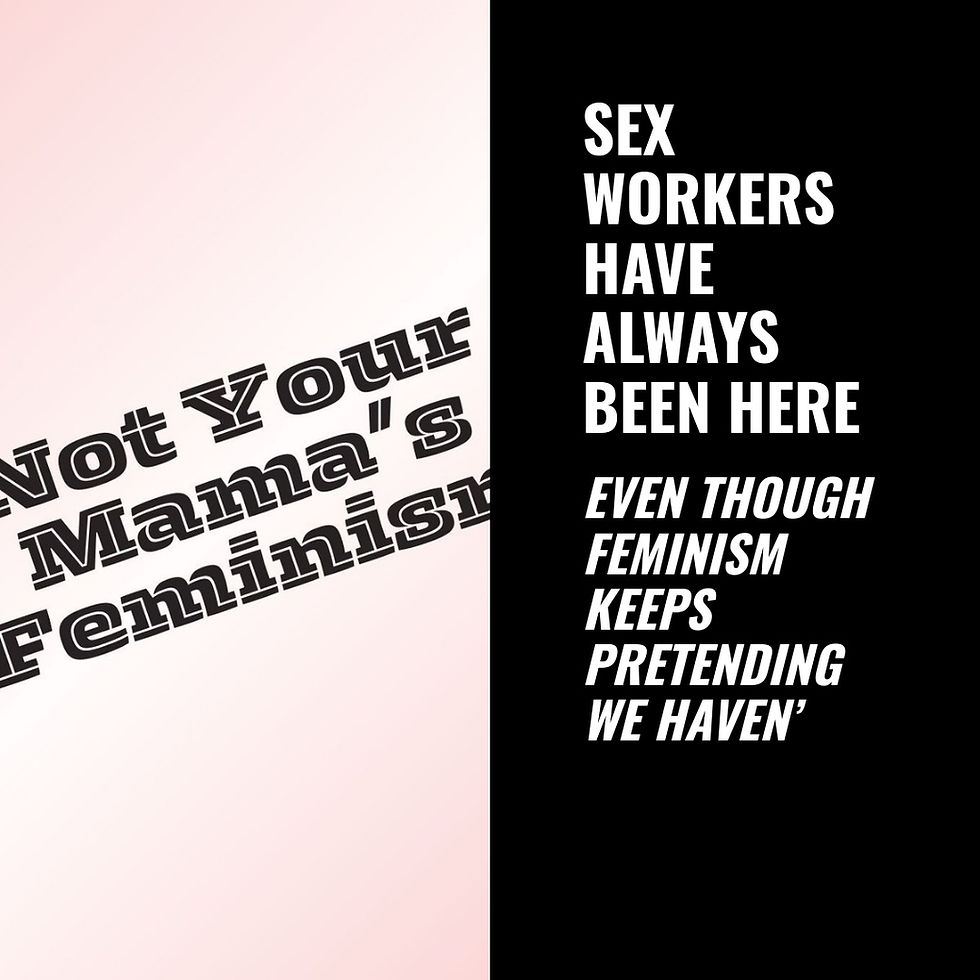Ad Nauseum
- Swop Behind Bars

- Dec 8, 2022
- 3 min read

As December 17th approaches and sex workers around the world mourn the loss of our fall comrades, we would like to, once again, reiterate how the conflation of sex work and sex trafficking is both harmful to sex workers and survivors and to provide the most basic information about the differences and the solution.
Sex Work is a lot of things to a lot of people. Some people do it by choice, like other professions. Like a lot of jobs, some people do it because they don't have better options. Some people are coerced into doing sex work against their will because they are vulnerable to exploitation-that is human trafficking. People choose sex work for many different reasons and under many different circumstances.
We have never met anyone who's life got better because they were arrested. Arresting sex workers or victims of human trafficking doesn't help. Most people arrested for prostitution are not victims of trafficking and victims who are arrested rarely trust the police enough to cooperate with their investigation-for good reason! Handcuffs don't help. The criminal record is permanent. The record of arrest is a lifetime sentence.
These arrests are often where the cycle of eviction and homelessness begin. Being arrested will often make someone more vulnerable to exploitation because it limits your choices and increases your obstacles to housing, employment, and services.
Criminalization is never going to be a solution for resolving poverty. Whether someone is trading sex by choice, circumstance or coersion, handcuffs don't help. The fragility of housing for people who trade sex is often rooted in Generational poverty and lack of access to services and support.
The women's prison population has exploded more than 800% in the last 20 years and when we remove the matriarchal bedrock from families and lock them in cages, we deprive their children, partners and communities of much needed stability and support. We are not fighting poverty, we are fighting impoverished people.
Being poor and unable to pay rent is exacerbated by arrest and incarceration – even for a short period – and can result in eviction and exposure to a higher risk of violence. These communities don’t live paycheck to paycheck – they live day to day and their lives become cyclical with poverty, eviction, arrest and incarceration, and the cycle continues to the next generation. The stigma of a prostitution arrest makes an already difficult situation exponentially harder. And arrests are increasing.
Coupled with the stigma of prostitution, criminal record and homelessness, these vulnerable members of our community are pushed further to the edge of society and increases their lack of access to basic human needs. The lethal combination of being poor with a criminal record for prostitution is something that our community based organizations could be far more efficient at addressing than the over policing of minority owned businesses and neighborhoods. We need peer led services and support organizations, not more arrests.
Rescue shouldn’t include handcuffs. Funding community based organizations with deep roots in the community they serve will have lasting positive influence while continuing to fund the over policing of marginalized and stigmatized communities – particularly those communities of color – only widens the divide and keeps people trapped in situations that make them unsafe. Sex trafficking is a community based problem that needs community based solutions. Evidence based services and support rooted in harm reduction principles allow community member access to safer spaces and give them a wider range of options for meeting their needs. Sex workers and victims of trafficking need more options, more support, more services, not more arrests.
The full decriminalization of sex work is an evidence based solution that will keep sex workers safe and help sex trafficking victims and survivors exit without a fear of being arrested. Full decrim has been in place for 15 years in New Zealand and violence within the sex trade has been greatly reduced. Sex workers are empowered to advocate for their own safety, and often turn to the police to report violence clients or criminals.
Sex workers are fully committed to ending exploitation and trafficking within the sex industry. We are best positioned to recognize and assist someone who is experiencing exploitation. Sex Workers are not the enemy. We are your best resource. If you want to end trafficking, listen to sex workers and stop the arrests.
Someone you love is a sex worker. Can they come to you without fear? Will you judge them because of what they do instead of who they are? Will you meet them where they are rather than where you want them to be?
Someone you love is a sex worker. If you want to help us - stand with us.




Comments